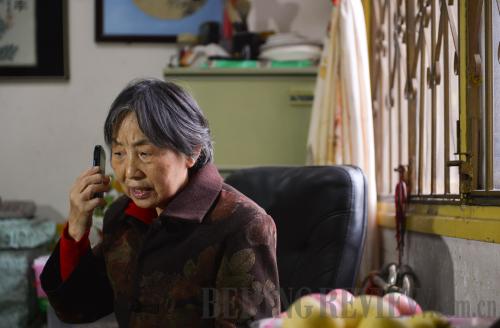|
 |
|
HOME SERVICE: Yuan Yongbin, a senior living in Tianxin District, Changsha City, Hunan Province, calls for service from home on September 29 (BAI YU) |
If you pass by the Golden Cradle Kindergarten in the Shimenying Community in Beijing's Mentougou District, you can see many children enjoying themselves in the playground. However, without the district government's decision to purchase early-education services from the private sector, the kindergarten would never have been built.
The Shimenying Community was developed to accommodate residents whose dilapidated houses were torn down during the renovation projects. The local government pledged to provide quality early education to children in the community, but they had to choose between opening a publicly funded kindergarten and contracting a private early-education institution to run one for them.
"To open a publicly funded kindergarten, we would have to recruit teachers and a management team. The costs are high," said a district official.
After careful consideration, the district government decided to purchase services from a private kindergarten. The kindergarten was selected through open bidding, with Golden Cradle emerging as the winner.
Golden Cradle is a high-end kindergarten, with regular monthly tuition costing around 6,000 yuan ($980). To make it affordable, the district government built a three-storey building, which can serve 450 children across 15 classrooms. It also pays the kindergarten an annual subsidy of 10.8 million yuan ($1.8 million), an average of 12,000 yuan ($1,970) per student. This brings tuition down to only 750 yuan ($123) per month, no more than most publicly funded kindergartens.
Support needed
In a bid to build a smaller and more efficient government, China has begun outsourcing some public services to the private sector.
On September 30, the State Council issued guidelines for government purchasing of public services from social organizations and private companies. The document said that the government is to purchase more services relating to education, employment, social security, health, housing security, culture and sports, as well as care for the disabled.
Nonetheless, the services that should be directly offered by the government, not suitable for private sector involvement, or are not included in government responsibilities, should not be purchased, according to the guidelines.
The guidelines also urge local governments and related departments to do research and formulate clear and in-depth directives for the purchasing of public services.
"Purchasing public services from the private sector will not only improve administrative efficiency, but also lower administrative costs and prevent corruption," said Li Tuo, a professor at the Chinese Academy of Governance.
In more economically developed regions such as Guangdong Province, local governments have already successfully purchased public services from the private sector.
Wang Ming, a professor at Tsinghua University's School of Public Policy and Management, said that the provincial government of Guangdong as well as several municipal and county authorities have promulgated documents to guide the purchase of public services. The guidelines detail government services that can be outsourced to the private sector as well as organizations that are qualified to provide such services.
Many social organizations look forward to government purchase of their services, with Beijing Stars and Rain being one of them.
Founded in 1993, the non-governmental education organization is dedicated to serving children with autism. So far, it has helped more than 6,000 autistic children and their families.
"Beijing has more than 20 public rehabilitation centers for autistic children and more than 100 that are privately owned. Many private institutions are better than their publicly funded counterparts in terms of facilities and services," said Sun Zhongkai, Executive Director of Beijing Stars and Rain.
Some private centers are struggling to survive financially. Sun said that the office rent and salary for 14 special education teachers cost his organization about 800,000 yuan ($131,148) annually, half of which comes from service fees and half from donations.
Since private special education institutions make up for the deficiency in public services, society and the government should increase support to them, said Wang Xinxian, Vice Chairman of the China Disabled Persons' Federation.
Last year, Beijing's Chaoyang District Government commissioned Beijing Stars and Rain to train instructors for autistic patients.
| 